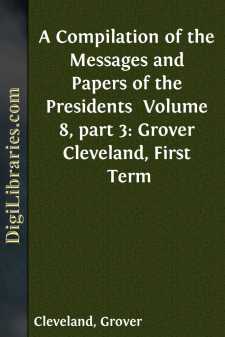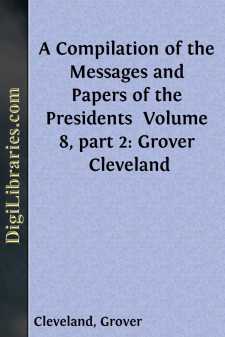Categories
- Antiques & Collectibles 13
- Architecture 36
- Art 48
- Bibles 22
- Biography & Autobiography 813
- Body, Mind & Spirit 142
- Business & Economics 28
- Children's Books 16
- Children's Fiction 13
- Computers 4
- Cooking 94
- Crafts & Hobbies 4
- Drama 346
- Education 46
- Family & Relationships 57
- Fiction 11829
- Games 19
- Gardening 17
- Health & Fitness 34
- History 1377
- House & Home 1
- Humor 147
- Juvenile Fiction 1873
- Juvenile Nonfiction 202
- Language Arts & Disciplines 88
- Law 16
- Literary Collections 686
- Literary Criticism 179
- Mathematics 13
- Medical 41
- Music 40
- Nature 179
- Non-Classifiable 1768
- Performing Arts 7
- Periodicals 1453
- Philosophy 64
- Photography 2
- Poetry 896
- Political Science 203
- Psychology 42
- Reference 154
- Religion 513
- Science 126
- Self-Help 84
- Social Science 81
- Sports & Recreation 34
- Study Aids 3
- Technology & Engineering 59
- Transportation 23
- Travel 463
- True Crime 29
A Compilation of the Messages and Papers of the Presidents Volume 8, part 3: Grover Cleveland, First Term
by: Grover Cleveland
Categories:
Description:
Excerpt
Grover Cleveland
Grover Cleveland was born in Caldwell, Essex County, N.J., March 18, 1837. On the paternal side he is of English origin. Moses Cleveland emigrated from Ipswich, County of Suffolk, England, in 1635, and settled at Woburn, Mass., where he died in 1701. His descendant William Cleveland was a silversmith and watchmaker at Norwich, Conn. Richard Falley Cleveland, son of the latter named, was graduated at Yale in 1824, was ordained to the Presbyterian ministry in 1829, and in the same year married Ann Neal, daughter of a Baltimore merchant of Irish birth. These two were the parents of Grover Cleveland. The Presbyterian parsonage at Caldwell, where he was born, was first occupied by the Rev. Stephen Grover, in whose honor he was named; but the first name was early dropped, and he has been since known as Grover Cleveland. When he was 4 years old his father accepted a call to Fayetteville, near Syracuse, N.Y., where the son had common and academic schooling, and afterwards was a clerk in a country store. The removal of the family to Clinton, Oneida County, gave him additional educational advantages in the academy there. In his seventeenth year he became a clerk and an assistant teacher in the New York Institution for the Blind, in New York City, in which his elder brother, William, a Presbyterian clergyman, was then a teacher. In 1855 he left Holland Patent, in Oneida County, where his mother at that time resided, to go to the West in search of employment. On his way he stopped at Black Rock, now a part of Buffalo, and called on his uncle, Lewis F. Allen, who induced him to remain and aid him in the compilation of a volume of the American Herd Book, receiving for six weeks' service $60. He afterwards, and while studying law, assisted in the preparation of several other volumes of this work, and the preface to the fifth volume (1861) acknowledges his services. In August, 1855, he secured a place as clerk and copyist for the law firm of Rogers, Bowen & Rogers, in Buffalo, began to read Blackstone, and in the autumn of that year was receiving $4 per week for his work. He was admitted to the bar in 1859, but for three years longer remained with the firm that first employed him, acting as managing clerk at a salary of $600, a part of which he devoted to the support of his widowed mother, who died in 1882. Was appointed assistant district attorney of Erie County January 1, 1863, and held the office for three years. At this time the Civil War was raging. Two of his brothers were in the Army, and his mother and sisters were largely dependent upon him for support. Unable himself to enlist, he borrowed money and sent a substitute to the war, and it was not till long after the war that he was able to repay the loan. In 1865, at the age of 28, he was the Democratic candidate for district attorney, but was defeated by the Republican candidate, his intimate friend, Lyman K. Bass. He then became the law partner of Isaac V. Vanderpool, and in 1869 became a member of the firm of Lanning, Cleveland & Folsom....




